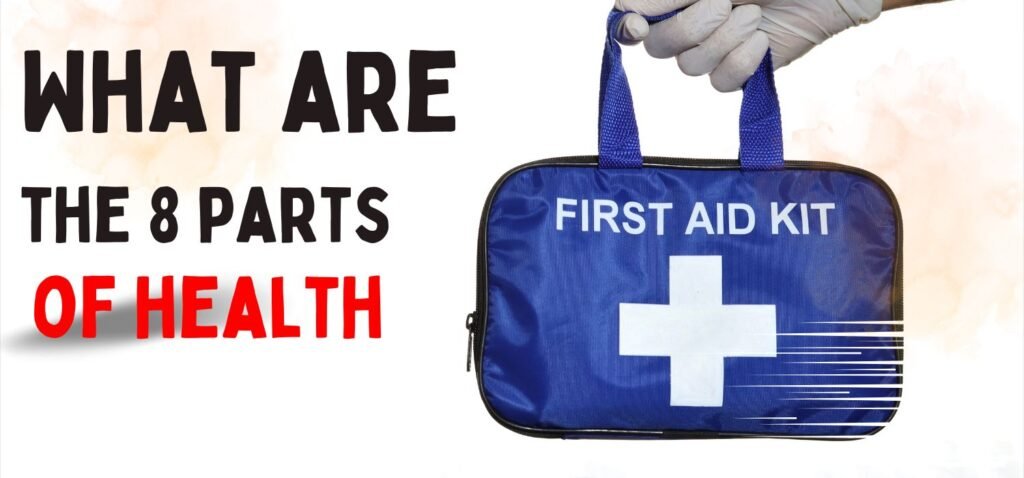Health is a multi-faceted concept that extends beyond physical fitness. A holistic approach to health considers various dimensions that contribute to overall well-being. Understanding and nurturing these eight parts of health can lead to a more balanced and fulfilling life. Here’s an in-depth look at each part:
Read More: Fitness how to start 7 Best Step BY step
1. Physical Health
Physical health involves the condition of your body and its ability to perform daily activities without excessive fatigue or physical stress. Key components include:
- Exercise: Engaging in regular physical activity to improve cardiovascular health, build muscle strength, enhance flexibility, and maintain a healthy weight.
- Nutrition: Consuming a balanced diet rich in essential nutrients to fuel the body, support bodily functions, and prevent diseases.
- Sleep: Getting sufficient and quality sleep to allow the body to repair and rejuvenate.
- Healthcare: Regular check-ups, vaccinations, and screenings to detect and treat illnesses early.
2. Mental Health
Mental health encompasses emotional, psychological, and social well-being. It affects how we think, feel, and act, and is crucial for handling stress, relating to others, and making decisions. Important aspects include:
- Emotional Regulation: Managing and expressing emotions in a healthy way.
- Stress Management: Techniques such as mindfulness, meditation, and relaxation exercises to cope with stress.
- Mental Disorders: Awareness and treatment of mental health conditions like depression, anxiety, and bipolar disorder.
3. Emotional Health
Emotional health is closely related to mental health but focuses more on our feelings and our ability to understand, express, and manage emotions positively. Elements include:
- Self-Awareness: Recognizing and understanding your own emotions.
- Empathy: The ability to understand and share the feelings of others.
- Resilience: The capacity to recover quickly from difficulties and emotional setbacks.
4. Social Health
Social health pertains to how well you interact with others and form healthy, supportive relationships. This dimension includes:
- Relationships: Building and maintaining healthy relationships with family, friends, and colleagues.
- Communication Skills: Effective verbal and non-verbal communication.
- Community Involvement: Participating in community activities and contributing to society.
5. Spiritual Health
Spiritual health involves a sense of purpose and meaning in life. It is not solely related to religion but encompasses broader concepts such as:
- Purpose and Meaning: Finding and living by your values and beliefs.
- Connection: Feeling connected to something greater than oneself, whether it be a higher power, nature, or humanity.
- Practices: Activities such as meditation, prayer, or mindfulness that foster spiritual growth.
6. Environmental Health
Environmental health focuses on the relationship between your health and the environment. It involves creating a healthy living and working space and protecting the planet. Aspects include:
- Clean Environment: Ensuring clean air, water, and living spaces.
- Sustainable Practices: Engaging in behaviors that protect the environment, such as recycling and conserving energy.
- Safety: Ensuring that your environment is free from hazards and promotes safety.
7. Occupational Health
Occupational health is concerned with finding fulfillment and balance in work and personal life. Key factors include:
- Job Satisfaction: Finding meaningful and satisfying work.
- Work-Life Balance: Managing time effectively to balance work and personal life.
- Healthy Work Environment: Ensuring a safe, healthy, and supportive workplace.
8. Financial Health
Financial health involves managing your financial resources effectively to reduce stress and achieve your financial goals. Components include:
- Budgeting: Planning and tracking your spending to live within your means.
- Saving and Investing: Setting aside money for future needs and investing wisely to grow your wealth.
- Debt Management: Managing and reducing debt to maintain financial stability.
Conclusion
The eight parts of health—physical, mental, emotional, social, spiritual, environmental, occupational, and financial—are interconnected and contribute to overall well-being. By paying attention to and nurturing each dimension, you can achieve a more balanced and fulfilling life. Remember, achieving optimal health is a continuous process that requires consistent effort and self-awareness.
FAQ on the Eight Parts of Health
Q1: Why is it important to consider all eight parts of health? A1: Considering all eight parts ensures a holistic approach to well-being, recognizing that each dimension affects overall health and quality of life.
Q2: Can one aspect of health impact others? A2: Yes, all dimensions are interconnected. For example, poor physical health can affect mental health, and financial stress can impact emotional well-being.
Q3: How can I improve my emotional health? A3: Practices such as mindfulness, journaling, seeking therapy, and developing emotional intelligence can improve emotional health.
Q4: What are some ways to enhance social health? A4: Building strong relationships, effective communication, and active community involvement can enhance social health.
Q5: How do I balance occupational health with personal life? A5: Set boundaries, prioritize tasks, manage time effectively, and ensure you take breaks to maintain a healthy work-life balance.





